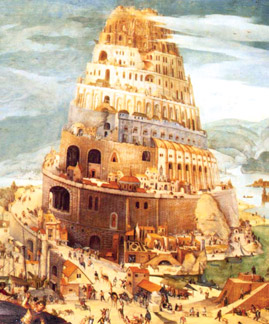Much ado about language

A parrot uncomprehendingly rattles off a string of words learned by
rote. And we marvel! Yet we seem to take our own astonishing linguistic
powers for granted – the ability to speak, listen, and understand, to
read and write. We all understand why language works; it is for our own
survival, because we have to communicate to survive.
The Holy Bible presents an interesting account on linguistic
survival.
 |
|
The city,
which was called Babel |
According to the biblical account, a united humanity of the
generations following the Great Flood, speaking a single language and
migrating from the east, came to the land of Shinar, where they resolved
to build a city with a tower “with its top in the heavens...lest we be
scattered abroad upon the face of the Earth.” God came down to see what
they did and said:
“They are one people and have one language, and nothing will be
withholden from them which they purpose to do.” So God said, “Come, let
us go down and confound their speech.” And so God scattered them upon
the face of the Earth, and confused their languages, and they left off
building the city, which was called Babel “because God there confounded
the language of all the Earth.”(Genesis). This is also called Confusion
of Tongues. Whatsoever being the reason for this confusion, we confront
with an important message about communication through this story. Once
people are not capable in proper communication, none of tasks could be
done, no expectation could be fulfilled.
It is language, more obviously than anything else that distinguishes
mankind from the rest of the animal world. At one time it was common to
define a human as a thinking animal, but we can hardly imagine thought
without words – not thought that is at all precise, anyway. More
recently, human have often been described as tool-making animals. But
language itself is the most remarkable tool that have invented, and is
the one that makes most of the others possible.
As Sri Lankans, we have a set of different names to call different
varieties of bananas and rice. But in Australia, I have only seen two
varieties of bananas; just bananas and lady finger bananas (they are
almost same to our seeni kehel). But on the other hand, Australians have
a big variety in potatoes, tomatoes, apples, pears and grapes. So the
Eskimos have many words to describe snow and Arabs to describe camels.
Different cultures have different values and beliefs and these are
expressed in their language whether it be verbal or non-verbal. Many
misunderstandings occur in intercultural communications because many are
unaware of these differences. It is important for one to learn the
differences of various cultures for one to understand one’s own
identity. Culture is learned but taught through the language. Language
is never the entity which has been invented in isolation.
It certainly has evolved gradually with the continuous development of
a culture. A culture is a building made of different beliefs in
supernatural, social behaviors, human emotions or ways of expressing
feelings, the language has continually adapted accordingly to
accommodate these indentified notion and gesture of human activity.
I gave the name ‘Metalanguage’ to this column, because I use the form
of English language to express and analyze the concept of language.
Broadly, any metalanguage is language or symbols used when language
itself is being discussed or examined. In logic and linguistics, a
metalanguage is a language used to make statements about statements in
another language.
As I believe, any language might not have sufficient words to
describe what human language seriously is.
|



